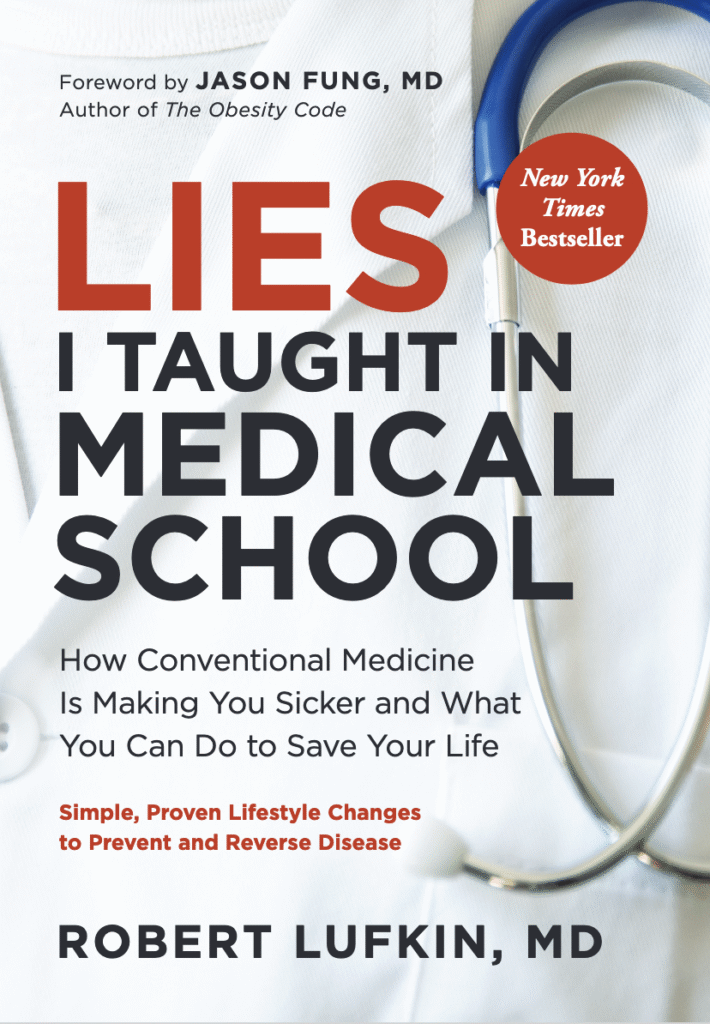Rewriting Health: Dr. Lufkin’s Bold New Perspective on Medicine and Nutrition
After decades in academic medicine, Dr. Robert Lufkin realized he wasn’t helping patients heal—he was helping them decline. His book Lies I Taught in Medical School is both confession and

Dr. Lufkin’s career in academic medicine spanned decades of respect and recognition. Yet, after years of following what he’d been taught in medical school and practicing conventional approaches to chronic disease, he reached a defining moment. This moment led him to question the very foundation of everything he’d believed about health and wellness. It was this transformation that would inspire his new book, Lies I Taught in Medical School—a title that, in its boldness, reflects the profound shift in his understanding of disease and its root causes.
The Turning Point: Questioning the Roots of Chronic Disease
It all began when Dr. Lufkin started noticing a pattern in his patients. Chronic diseases—diabetes, obesity, Alzheimer’s—were no longer confined to the individuals he saw in his clinic; they were affecting his own family, colleagues, and friends. “Despite decades of ‘evidence-based’ treatments, we weren’t curing these conditions; we were managing their decline,” he explains. This realization, both personal and professional, forced him to ask a crucial question: What if the system was wrong about the root causes of these diseases?
This wasn’t a question Dr. Lufkin approached lightly. He was trained to follow the traditional medical model, which often prioritized pharmaceutical solutions and symptom management. But when the system failed to prevent or cure these widespread, debilitating conditions, he began to look beyond the textbooks, seeking answers that went deeper than symptom suppression.
Advocating for Nutrition: The Response from Peers

Dr. Lufkin’s evolution in thinking didn’t come without resistance, particularly from his peers in academic medicine. As he began advocating for nutrition-based approaches like the ketogenic and carnivore diets, the reactions were mixed. “Let’s just say it was… mixed,” he recalls with a chuckle. “Some colleagues were curious, even quietly supportive. But many dismissed it outright because it challenged the pharmaceutical-first model we were all trained in.”
But for Dr. Lufkin, the growing body of evidence surrounding the success of diet-based interventions in treating chronic conditions couldn’t be ignored. “Academic medicine doesn’t reward paradigm shifts—it punishes them,” he admits. Yet, as he continued to see his patients benefit from these alternative approaches, the science and real-world results spoke louder than any criticism.
The Carnivore Diet: From Skeptic to Advocate
It was through his own personal experiment that Dr. Lufkin became convinced of the power of diet to transform health. Initially skeptical of the carnivore diet, he decided to try it out for himself. “It was like flipping a switch,” he recalls. The results were immediate and dramatic: more energy, mental clarity, and a reduction in joint pain. This experience opened up new avenues of exploration, leading him to delve into evolutionary biology, food toxins, and metabolic diseases. What he once dismissed as “fringe” ideas turned out to be biologically sound and clinically powerful.
“I wasn’t dogmatic about it,” Dr. Lufkin reflects. “I follow a meat-based, low-carb lifestyle most of the time, but occasionally I’ll have some berries or dark chocolate. I don’t even like the word ‘cheat’—it’s about understanding what your body can tolerate and what helps it thrive.”
Chronic Disease: The Common Denominator
One of the most striking revelations from Dr. Lufkin’s years of practice was the undeniable connection between poor metabolic health and chronic disease. Heart disease, diabetes, cancer, even neurodegeneration—all of these conditions shared a common root: poor metabolic function. And the real tragedy, he argues, is that many of these diseases are preventable, yet the medical community has long been focused on treating the symptoms rather than addressing the root cause. “We were trained to treat the downstream effects, not address the root cause,” he admits.
Aging, Illness, and the Myth of “Normal” Decline
Another powerful message Dr. Lufkin shares in his book is the idea that much of what we consider “normal” aging—chronic illness, fatigue, brain fog—is not actually inevitable. “We’ve normalized dysfunction,” he says. “We expect to slow down, lose our memory, and take five prescriptions by age 60. But that’s not normal—it’s common. There’s a big difference.”
He believes that when people clean up their diet, manage stress, get regular movement, and prioritize quality sleep, their bodies can rebound in remarkable ways—ways that might seem miraculous but are simply the body’s biology functioning as it was meant to.
Mental Health: A Surprising New Insight
In his podcast and discussions with some of the brightest minds in health, Dr. Lufkin has had his perspectives challenged and expanded. One of the most profound insights came from Dr. Chris Palmer, who connected mental illness with metabolic dysfunction. “It reframed how I think about psychiatric disorders—not as isolated brain diseases, but as systemic dysfunctions rooted in mitochondrial health,” Dr. Lufkin explains. This insight shifted his thinking about the origins of mental health issues and deepened his understanding of the interconnectivity of body systems.
Read About: Dismantling Disease: How Protein Degraders Are Changing Drug Discovery
The “Extreme” Carnivore Diet: A Necessary Challenge
When it comes to critics who label the carnivore diet as “extreme,” Dr. Lufkin is quick to turn the argument around. He points out that what is truly extreme is the modern diet, which is often processed, sugar-laden, and filled with chemicals that our ancestors never consumed. “As for fiber and plant nutrients, the clinical evidence supporting their necessity is surprisingly weak, especially when you remove inflammatory foods,” he notes.
He’s also careful to emphasize that carnivore isn’t for everyone, but the growing number of people who have found relief from chronic conditions through the diet is hard to ignore. “Dismissing it outright ignores the growing body of evidence and the real-world successes we’re seeing,” he adds.
True Health: It’s Built, Not Given
Throughout his years of treating disease, Dr. Lufkin has learned a fundamental truth about health: true wellness isn’t something created in a doctor’s office. “True health isn’t created in the doctor’s office—it’s built in your kitchen, your mindset, and your daily habits,” he explains. While medication can be useful in certain cases, it’s never the foundation of healing. The body has an incredible ability to regulate and repair itself, if only it is given the right tools—tools like proper nutrition, movement, and stress management.
Empowering Readers: A New Vision for Health
When asked what he hopes readers will take away from Lies I Taught in Medical School, Dr. Lufkin’s message is clear: empowerment. He wants people to understand that they have far more control over their health than they’ve been led to believe. “The most damaging lie?” he muses. “That chronic disease is inevitable, and that the best we can do is manage it. That’s not just false—it’s fatal.”
By challenging long-held assumptions and opening up new possibilities, Dr. Lufkin’s message is one of hope and personal responsibility. The choice to reclaim one’s health may not always be easy, but it is, he believes, one of the most important decisions anyone can make.
Through his writing, speaking, and advocacy, Dr. Lufkin is on a mission to reshape our understanding of disease and the true potential of human health—an understanding that begins, not in the clinic, but at the dinner table.








